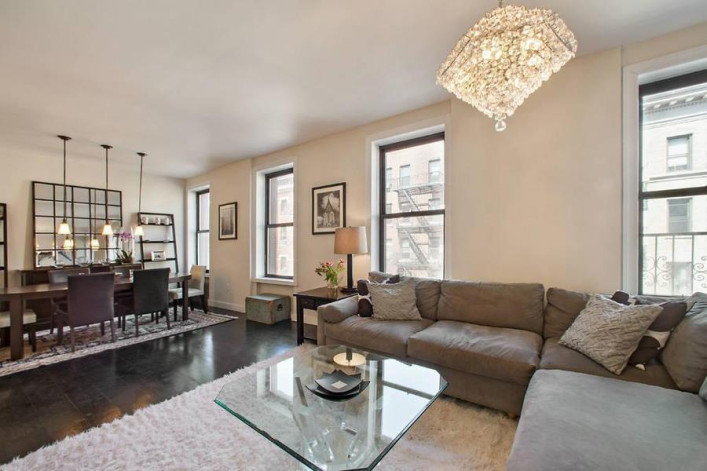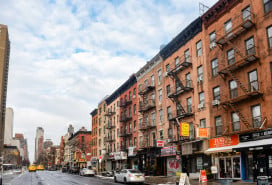Is it really time to sell your NYC apartment? Here are 4 ways to tell

You’d have to be living in a cave or on a desert island not to know how hot the New York real estate market is this spring.
Gary Malin, president of Citi Habitats sums up what everyone is thinking: “We are in an appreciating market right now and prices have the potential to reach all time highs in the near future. ...If the sales market continues on this path, it will surpass its previous high, which was set in 2008, some time this year."
The reasons: shrinking inventory, low mortgage rates, international buyers. A perfect storm. So how do you know if you should take the plunge and put your apartment on the market?
Here are 4 questions to ask yourself.
1. Is your apartment in the “sweet spot?"
Look carefully at what is going on in their particular market before they put their property up for sale.
“Some categories are not selling as quickly or as high as others," says real estate broker Deanna Kory of Corcoran. "Downtown is selling more quickly than uptown. Condos are selling more quickly than co-ops, and two-bedroom apartments with two baths in the $1.2-to-$1.4 million range are a sweet spot."
Do some digging into your own niche market, she says.
“What’s the competition, what has gone into contract and what has most recently closed?" says Kory. "It’s as crazy as 2007 for certain locations, sizes and types but other areas, sizes and types may not be faring as well and they don’t make the headlines."
Educated guesses can only take you so far in a transitional market like this one. To find out what actual buyers are willing to pay for your co-op, condo or brownstone, consider discreetly "pre-marketing" it. New York City real estate brokerage Triplemint has an entire data-driven pre-marketing platform that provides a way to quietly test your asking price and your marketing strategy among real-life qualified buyers before publicly listing your home. There's no charge to participate and no obligation to enter a traditional listing agreement at the end of the pre-marketing period if your place hasn't sold. Click here for more information.
2. Where are you planning to live after you sell? Are you upsizing or downsizing?
“We’re asking our would-be sellers what their end-goal is, before determining whether this is the time to sell,” says real estate agent Ari Harkov of Halstead.
If a move to the suburbs is part of your plan for the next 12-36 months, now is probably a good time to act, as home prices in the suburbs haven't appreciated as much as those in the city.
"There is an opportunity to sell high (in the city) and buy low (in the suburbs)," says Harkov. However, he says, "that window is quickly closing from what I am being told by others in the business who work in the NYC metropolitan area suburbs."
If, on the other hand, "you're thinking of upsizing within the city--and if it is within your budget to do so--now is a great time to make the move. Waiting to buy in a market with rising prices could cost you quite a bit of money," says Harkov.
Say, for instance, your apartment is worth $1 million and the place you want to buy is worth $2 million. The market goes up 10%. Your apartment is worth $1.1 million (a gain of $100k) but the place you want to buy is worth $2.2 million (a gain of $200k), explains Harkov. Therefore, it “costs” you $100k to wait.
"In NYC these numbers are exacerbated by the fact that gains on larger properties are even greater given the fact that the demand and financial wherewithal of those buyers exceeds the supply to a greater extent than in the smaller apartment one-bedroom / studio markets. You could make a case that in the current market if the one-bedroom goes up 10%, the two-bedroom or three-bedroom might go up 15%. At that point the spread and, therefore, the cost to the buyer increases even further," he says.
That's why, Harkov says, the general idea is that in a price-appreciating, low mortgage environment, upsizing is a more strategic move.
In addition, he notes, "your purchasing power is higher than it would be in a higher interest rate environment and you therefore have an opportunity to stretch your down payment further. One of the points buyers can sometimes forget when thinking about appreciation is that if, say, you buy an apartment for $2 million and put down $1 million, if the apartment appreciates 10%, the property has gone up $200k but that $200k is based off an investment of $1 million not $2 million, yielding a cash on cash return of 20%."
If, on the other hand, your second or third bedroom is no longer necessary and you want to downsize, yours is exactly the kind of apartment that young families eager to stay in the city want, so you're likely to see high demand (and, therefore, high bids).
Real estate agent Victoria Vinokur of Halstead agrees with Harkov that “larger apartments are in very short supply and in extreme demand. And, you’ll have some good choices for smaller units.”
She adds that even if your property has some less desirable features, “the market is strong enough for buyers to be willing to make compromises.”
3. Could your place attract foreign buyers?
Your condo may be just what a foreign investor is looking for, and the international market continues to be strong.
According to Malin, one third of Manhattan condos are purchased by international buyers. They see Manhattan real estate as a safe haven for their money and a relative bargain.
“In London, luxury condos average $4,500 per square foot, in prime areas of Manhattan it’s $1,500," says Malin.
Vinokur agrees that “if you are a condo owner or have an investor-friendly property--for example, a co-op that is open to foreign nationals and/or allows subletting right away with few restrictions--foreign interest and demand is stronger than ever. The reasons include political uncertainty in Italy, economic changes in France, recent events in Cyprus, changes in real estate taxes in the U.K. and continuous capital outflow from Russia.”
4. Is your neighborhood seeing lots of development?
Take a look around. If a new development or conversion is opening up for sales soon in your area, that’s going to increase inventory and potentially decrease demand for what you want to sell.
“Developers are gearing up and could soon be flooding your neighborhood with inventory," says real estate agent Georgia Kaporis of Halstead.
Related:
10 apartment staging mistakes that can cost you a sale
Ask an Expert: We're leaving New York. Should we sell our Brooklyn condo or rent it out?
Ask an Expert: Should we sell our apartment when there's competition in the building?
Looking for a two-bedroom? Better hurry--or set your sights on a 1.5 bedroom
Top negotiating mistakes EVERYONE makes (that means buyers, sellers and their respective brokers)
Insider tips for selling/renting out your apartment in the "slow" season
Sellers: How to make a killer video of your apartment (and why you should)
Top negotiating mistakes of sellers and their brokers
Sellers: How to cut the commission, rock the open house, ace the appraisal + more

























